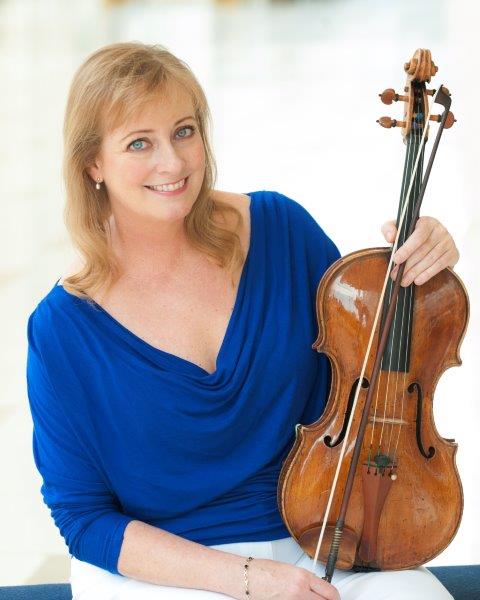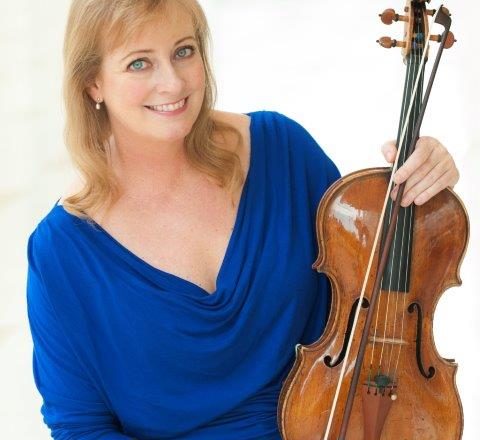OFFSTAGE WITH: Cynthia Phelps; Playing the Tune and Calling It, Too

By James R. Oestreich
CYNTHIA PHELPS does not exactly blend into the background: not at the New York Philharmonic, where, as principal violist, she sits up front, just to the maestro’s right, in Kurt Masur’s preferred seating, her alert bearing and model posture enhancing the effect of her striking looks. And certainly not in a little restaurant on Broadway, opposite Lincoln Center, with a photographer hovering to catch her every changing expression.
But being the center of attention suits her well, however odd that may seem for someone who plays an often overlooked instrument, which generally finds itself in the middle of the orchestra and the middle of the harmony.
“I even like to sit high when I’m driving,” Ms. Phelps said recently, explaining her choice of a Nissan Pathfinder with four-wheel drive to travel the heavily paved terrain between work and her home in Leonia, N.J. “I have a real complex. I like being in charge of my own section in the orchestra. I like to tell people what to do.”
In part, the complex may be a reaction to her place in the family pecking order, as the fourth of five sisters, all musicians. (Together they form a piano quintet, and they occasionally perform as such.) Or perhaps it comes from the fact that her instrument gets no respect. At a time when excellent young violists seem to be everywhere, viola jokes (What’s the difference between a viola and a coffin? The coffin has the corpse on the inside.) have made their way from orchestral circles to a broader musical public.
In any case, Ms. Phelps’s visibility, along with her superb musicianship and her leadership qualities, makes her as apt a symbol of Mr. Masur’s “new” Philharmonic as any. Ms. Phelps, who was raised in Los Angeles and went to the Philharmonic from the Minnesota Orchestra in September 1992, was the first principal player hired by Mr. Masur in his tenure as music director. She narrowly beat out a candidate for the position from within the orchestra, Rebecca Young, who around the same time was offered the position of principal violist with the Boston Symphony Orchestra.
Mr. Masur, in a conversation a while back about the state of the orchestra, said he was gratified that other members of the orchestra had welcomed Ms. Phelps immediately and wholeheartedly. He continued, “As they heard her they said, ‘O.K., that’s a first chair, without doubt.’ “Ms. Young, in fact, became one of Ms. Phelps’s closest friends in the orchestra in their season together, and although Ms. Young is playing with the Boston Symphony this season, she will return to the Philharmonic in the fall as associate principal violist.
“A lot of musicians told me not to take the job, that I’d hate the orchestra,” Ms. Phelps said. “But Becky Young called me the week before the first rehearsal. It was so warm right away, and people were so nice.”
The time and place for the move were right, she explained, because she had a 3-year-old daughter, Christina. In Minneapolis, she said, she had “the best principal viola contract in the country.” It allowed her to travel to play solos and chamber music, but she found that the travel disrupted the continuity of her orchestral work and kept her away from Christina.
“Deborah Borda made it very clear to me that she could in no way match that contract in terms of time off and flexibility,” Ms. Phelps said of the Philharmonic’s managing director, who had herself come to New York from the Minnesota Orchestra. “But in New York it isn’t necessary. There’s so much going on that it allows me to play here.”
She does still travel. Her rosy color at the end of a long, bleak winter, she said, came from Tucson, Ariz., where she had just played in the Winter Chamber Music Festival. And of course, she travels with the orchestra, most recently to Europe and imminently to Asia, with Christina and nanny in tow.
“This poor child has been dragged to all ends of the earth,” Ms. Phelps said. “So she really hangs on to the things she can control, like potty training. I guess she takes after me, because I like to be able to control things. She’s very willful, so it’s that much more of a challenge.
“Still, I can’t believe how great it is to be a mother. To find something that means more than making music has been rich and rewarding. Every day she teaches me something. And 3 is so much better than 2.”
But Christina has proved a sore disappointment in one area. Although she loves ballet, she has revealed no musical gifts.
“She’ll start singing in tune and it goes haywire,” Ms. Phelps said. “I’ll call my mother and say, ‘Mom, do something!’ Isn’t it terrible to admit that I want to send her back if she doesn’t have perfect pitch?”
She might well turn for counsel to her mother, Dawn Neal, who still lives in Los Angeles. Ms. Neal does not have perfect pitch herself but is a violinist and taught music to all five of her children. Although Ms. Phelps, who does have perfect pitch, started on the violin, she grew to dislike the sound and still speaks with some horror of the E string, the highest.


